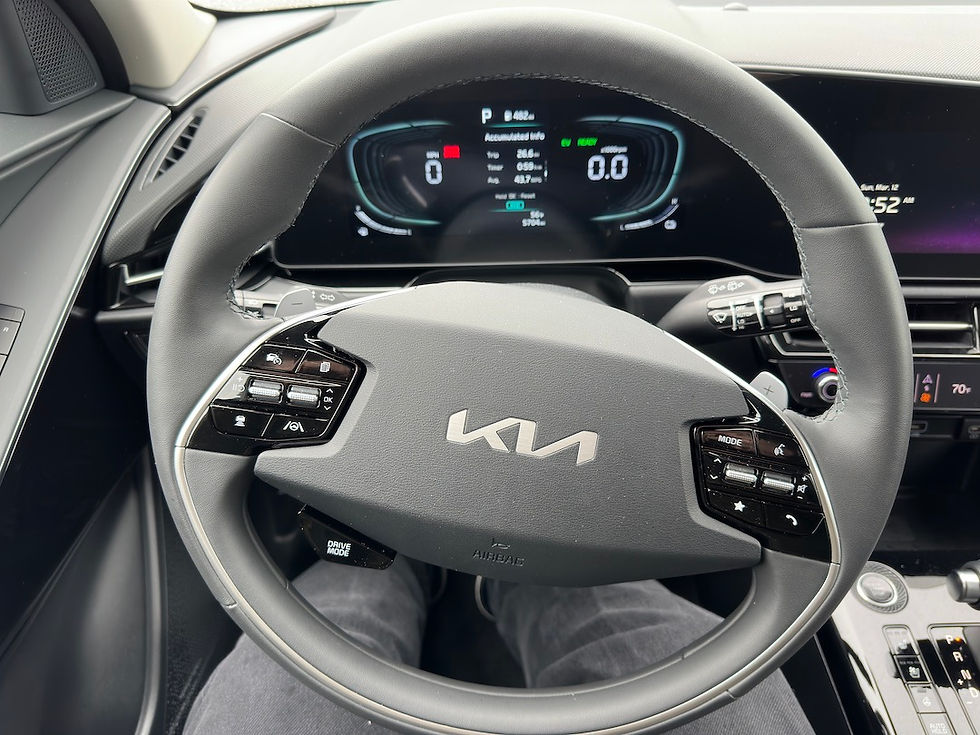To Plug or Not to Plug: The 2023 Kia Niro Hybrid
- Mike Hagerty

- Apr 5, 2023
- 3 min read
Updated: Dec 31, 2024

This is a big year for the Kia Niro. An all-new Niro with a radically different appearance, more interior room, including best-in-class second-row legroom, passenger room and interior volume and three enhanced, efficient powertrains.

Your choices in Niro are now EV, PHEV (plug-in hybrid) and the Hybrid, which was our tester this time around.


The PHEV, in regular hybrid mode, gets an EPA-estimated 48 miles per gallon combined city/highway and the Hybrid gets 49. That's inconsequential. With the PHEV, you get 33 miles of pure electric power per charge before the gasoline/hybrid engine kicks in. So, why would anyone buy the hybrid instead?
Pure and simple, it's economics and how you drive. The base price of the PHEV in SX Touring Trim, with destination charges, is $4,700 more than the Hybrid in the same trim.
The Niro PHEV fuel tank holds 9.8 gallons. The Niro Hybrid, 11.1.
At 49 mpg, an 11.1 gallon fuel tank is good for 543 miles, and the average American driver only does 288.46 miles a week. At that math, the Hybrid needs a fill-up every 13 days, which works out to 28 tanks per year.
At the current cost of gasoline here in Suburban Sacramento ($4.50/gallon), for the PHEV to pay for itself, you'd need to not buy 1,044 gallons of gas for the PHEV that you would have bought driving the hybrid. That's 106.57 full tanks.
How long would that take?
A lot of that depends on you.
Here's where you have to be honest with yourself. Will you plug in the PHEV without fail (Not all PHEV owners do)?
Will you ALWAYS get those 33 miles of pure electric driving---and will that be enough for you most of the time to never use a drop of gasoline?
If you do, and if you drive the average amount above, only 41.2 miles a week will be using gasoline. That's 11.6 weeks between fill-ups instead of 13 days.
And, if you drive less than the national average and can do more of your driving on electricity, your break-even window becomes shorter. What's harder to quantify in dollars is how much the knowledge that you're putting out zero tailpipe emissions for 33 miles at a shot is worth to you. For a lot of people, though, that ends up not penciling out. So the Kia Niro Hybrid delivers the fuel economy at a significantly lower price than the PHEV.




Beyond that, there aren't real differences between the Niro PHEV and the Niro Hybrid. In SX Touring trim, the base price (with destination) of the Hybrid is $36,085. And that brings an identical laundry list of standard equipment---a comprehensive suite of active safety features, electronic stability control, a 10.25-inch center screen with navigation, a Harman/Kardon premium audio system with Android Auto and Apple CarPlay as well as a free three-month trial of SiriusXM Satellite Radio, smart key with remote start, wireless phone charger, heated and ventilated front seats, a power driver's seat with memory, heated steering wheel, dual-zone automatic climate control with rear vents, 18-inch alloy wheels, roof rails, rear privacy glass, rain-sensing wipers, a power sunroof, LED headlights and fog lights, LED interior lighting, power-folding outside mirrors, aluminum pedals and forward parking distance warning.



The only extra-cost options on our tester were the black C-pillar exterior trim ($195) and carpeted floor mats ($155). So the as-tested price adds up to $36,435.



Again, the question of to plug or not to plug is really something your budget, driving habits and how much you value any amount of pure electric range have to determine, and everyone's answer is going to be a bit different. The good news is that Kia's making the same very good compact crossover for both those equations---plus an EV version that we're eager to drive and report back on.





